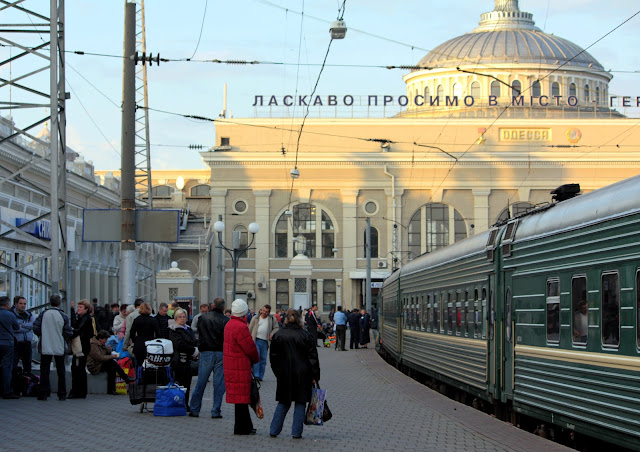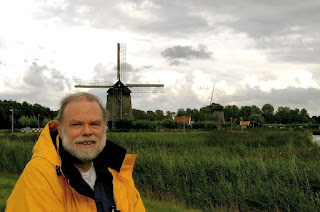 |
| Waiting to board Train 34, Odesa-Moscow. |
"The news of Europe, as it occurs," intoned Bob Trout of CBS News, on August 28, 1939. "The world is now awaiting the arrival in Berlin of Sir Nevile Henderson, British ambassador to Germany, who took off from England's Heston Airdrome nearly three hours ago, flying to Berlin with the British cabinet's answer to German chancellor Adolf Hitler."
January 2022: The flurry of diplomacy between NATO and USA, on one side, and Russia (notably without almost any Ukrainian participation) continues tomorrow with USA Secretary of State Antony Blinken flying to Geneva to meet his Russian counterpart Sergei Lavrov.
 |
| Train 34 stops at Konotop, Ukraine, near the Russian border. |
Timothy Snyder, in his recent post on "How to think about war in Ukraine," addresses today's parallel Russian case against Ukraine:
One of the central elements of Russia's traditional attacks on Ukraine has been that "Russian speakers" in Ukraine are subject to oppression. [Link in original.] This is conceptually misleading, in that most Ukrainians are bilingual in Ukrainian and Russian to one degree or another, and in that language does not determine identity (if it did, I'd be English). But insofar as it is reasonable to talk about "Russian speakers" in Ukraine, the Ukrainian president himself is certainly one of them. Zelens’kyi is from eastern Ukraine, and his dominant language is Russian. So a "Russian speaker" in Ukraine can be elected president. Indeed, "Russian speakers" in Ukraine are far more free in Ukraine in this respect than are "Russian speakers" in Russia. In Russia, there is no democracy for anyone.
The most bizarre aspect of this artificial crisis is that Ukraine itself has actually posed no threat to the Russian Federation. In fact, there is no immediate threat to Russian security from anyone. Nobody outside Russia has any desire to occupy Russia or to subvert its best future as a prosperous and happy nation. Russia (that is, Putin and his associates) simply seem to believe that the time has come to disrupt the post-WWII collective security architecture represented by NATO and its presumably American puppet masters, and Ukraine is the convenient pressure point for Russian threats.
(I'm not defending that post-WWII collective security arrangement as being above criticism or reform, but threatening to kill Ukrainians seems more likely to reinforce that arrangement than pose an intelligent critique.)
In choosing specifically to threaten Ukraine, not principally for any Ukrainian-based danger to Russia but instead for NATO's supposed transgressions, Russian representatives have practically admitted this very point. Despite the lack of a logical link between Russia's desired changes in NATO policy (denying NATO membership to Ukraine, pulling back missiles from Russia's border countries) and Ukraine itself, Russia threatens military repercussions for any failure of NATO (read the USA) to accept its demands. Russian is not in a position to attack the USA directly; the calculation seems to be that threats against Ukraine would satisfy the need to make American non-cooperation costly.
And why not? Whether or not Russia actually has any plans to attack Ukraine beyond its present lightly-disguised occupation of the Donbass region, the current massive Russian-Belarus' military exercises are a relatively risk-free way to demonstrate Russian military readiness. The ideological basis has been prepared: Putin, for example, recently published his own position that Ukrainian sovereignty only makes sense within the context of the essential unity of a shared Russian-Ukrainian identity. "...Russians and Ukrainians were one people -- a single whole." ("On the historical unity of Russians and Ukrainians.")
Meanwhile, any legitimate reasons for Eastern Europeans to worry about aggression from Russia (or, recently, the Soviet Union) is completely ignored. This omission allows Russia to assume that NATO expansion is a USA-driven move against Russia rather than a choice made by Russia's neighbors (rightly or wrongly) to compensate for their own weakness against their powerful and sometimes predatory neighbor.
Russians themselves may not be enthusiastic about an adventure in Ukraine, but the effective space for dissident voices in Russia has practically closed with breathtaking decisiveness in the past year.
What is the role of Quakers and other peace-oriented voices in the present artificial crisis?
- Continue speaking truth: there is no actual crisis! Persistently distinguish posturing from actual emergency; persistently resist the designation of enemies when no real enemies exist.
- Strengthen and build ties among all those who advocate peace and friendship in every land where leaders and elites rely on enemy-images to bolster their popularity or their impunity.
- Do not allow broad labels, such as "the Russians," "NATO countries," "The West," to obscure the actual human beings who live in the lands behind those labels. Every nation has its treasured values; every nation also struggles with forces that seek to corrupt those values and replace hope with disillusionment. Right now, the USA, for example, is bombarded with the association between "Russia" and the specific actors within Russia who want to sow doubt and discord in the USA, support the previous American president, and encourage us to be cynical about democracy. Resist!
- If you have the ability to serve or travel or study or do business in any country that is on the front line of our current tensions or standoffs, do so. We need to subvert the mechanisms of hostility with our own bodies and voices whenever possible.
During the previous Russian-Ukraine crisis in 2014, Judy and I were living in Russia, as we were during the 2008 Russia-Georgia crisis. In 2014, Moscow Friends Meeting was not immune from the tensions caused by the Ukrainian-Russian conflict, but to my great comfort and relief, we were able to be an observatory for the world Quaker family, praying our way toward unity instead of division.
In his article, Timothy Snyder says (despite his numerous sources all over the region), "...I am not sure what will happen next." Truthfully, all our clever commentaries will probably not succeed in predicting what will happen next in the Russia-NATO standoff. What we can do is pray for all those who stand for truth and peace, especially where that stand has become risky. We can and must resist the convenient labels offered on all sides by those who prefer us to see only "enemies."
The standoff: today's briefing.
CBS: Reading Russian minds.
Russia's wish list: draft agreements.
Navalny on "Putin's trap."
Russia's military moves, as seen on social media.
"Allied Resolve" exercises in Belarus.
Is Russia prepared for financial sanctions? (Russian.)
Related: War, sponsored by Admiral. The zombies are coming out.
 |
| Source. |
Since we left Russia, there are new rules.
Kathleen Bell considers our flawed Quaker heroes.
The Black Quaker Lives Matter (online) Film Festival.
Albert Collins, "If Trouble Was Money."
"My mother used to tell me, she said 'Son, there's gonna be days like this... son, I don't want you to quit.'"
1 comment:
I turn here for credibility. Thank you.
Post a Comment